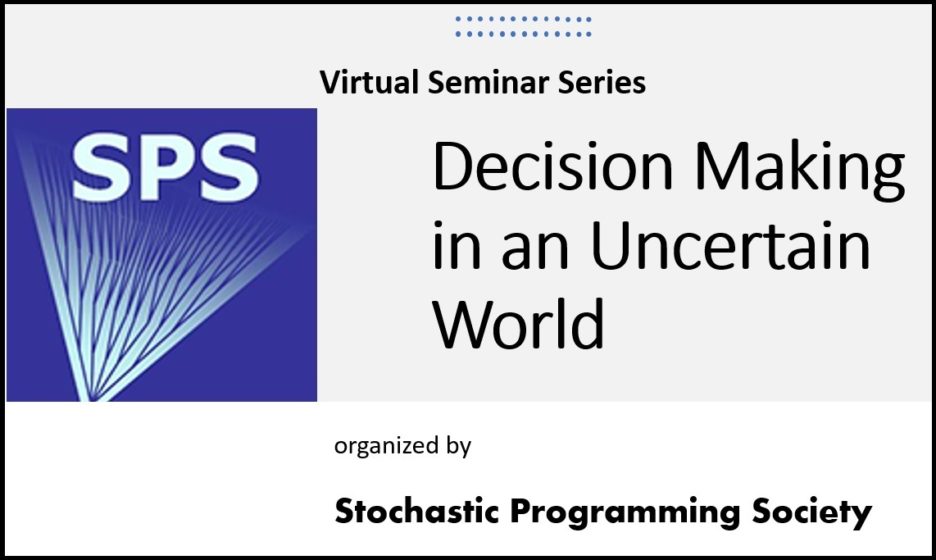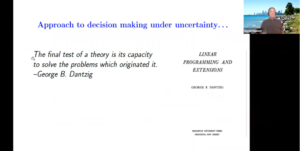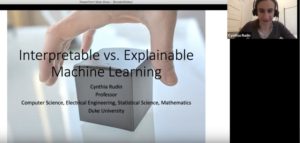
Stochastic programming society virtual seminar series: decision making in an uncertain world
By Güzin Bayraksan and Francesca Maggioni
In the summer of 2020, the SPS held a virtual seminar series aptly entitled “Decision Making in an Uncertain World”.
The Stochastic Programming Society is a worldwide group of researchers who are developing models, methods, and theory for decisions under uncertainty. It exists as a technical section of the Mathematical Optimization Society (MOS) and promotes the development and application of stochastic programming theory, models, methods, analysis and software tools. It encourages the exchange of information among practitioners and scholars in the area of stochastic programming. The activities of SPS facilitate the advancement of knowledge through its triennial conferences “International Conference on Stochastic Programming” (ICSP), specialized workshops, and maintenance of the web site, Twitter and LinkedIn accounts.

David Morton’s answer to “What is your approach to decision making under uncertainty?” during his talk on COVID-19 reopening
The Virtual Seminar series was designed by the governing board of the Stochastic Programming Society, also known as the “Committee on Stochastic Programming” (COSP), thanks to the suggestion of a member of SPS, Vincent Leclère. The committee decided on the name of the seminar series, the format of the seminars, and names of the speakers, taking into account their provenience from all around the world, gender representation, and research topics. The webinars took place biweekly on Fridays 7-8 AM Pacific Time in order to allow people at many different time zones to attend the events, starting on May 29th, 2020 using Zoom platform, kindly supported by the Integrated Systems Engineering Department of the Ohio State University.
The series consisted of seven talks with presenters from various parts of the world: two from Europe (Steffen Rebennack and Daniel Kuhn), one from South America (Alejandro Jofré) and four from the United States (Cynthia Rudin, Alexander Shapiro, David Morton and Katya Scheinberg). The seminar series covered a variety of topics including theory, computations, and applications. It also included topics that are relevant to the society but that go beyond the traditional topics of interest to the society such as machine learning. Topics covered by the series included the following areas of research:
- Real-world Stochastic Programming Applications such as safe COVID-19 Reopening (David Morton’s talk) and pricing in electricity markets and extension to markets with a massive entry of renewable energies and distributed generation (Alejandro Jofré’s talk), Brazilian interconnected power system problem (Alexander Shapiro’s talk);
- Theory and Computations of Stochastic Programming such as cut-sharing in Stochastic Dual Dynamic Programming (Steffen Rebennak’s talk) and computational and theoretical aspects of solving multistage stochastic programs (Alexander Shapiro’s talk);
- Distributionally Robust Optimization such as moderate deviations theory and distributionally robust optimization, which aim to learn from correlated data (Daniel Kuhn’s talk);

Cyntia Rudin’s talk on Interpretable Machine Learning
- Related Fields such as interpretability versus explainability in Machine Learning (Chyntia Rudin’s talk), and convergence analysis of Stochastic Algorithms (Katya Scheinberg’s talk).
Because the seminars covered a wide variety of topics, COSP decided to begin each talk by asking the speakers what their approach to decision making under uncertainty was. Answers to this question by the speakers (in alphabetical order of their last names) provided stimulating “food for thought” to the community:
- Alejandro Jofré advocated “combining Stochastic Optimization with the interaction of different agents” in a system where all agents are affected by uncertainty. He emphasized taking into account the interaction of different agents, who may have their own objectives.
- Daniel Kuhn, instead of supporting one approach, “praised many different approaches depending on the problem at hand” and inspired the community to “find new approaches” that have not been used before.
- David Morton quoted one of the pioneers of Stochastic Programming, George B. Dantzig, “The final test of a theory is its capacity to solve the problems which originated it” (see Figure 1), encouraging the SPS community to apply its models and methods to solve real-world problems.
- Steffen Rebennack said that his approach to decision making under uncertainty is to “incorporate all available information on the uncertainty in an optimization model.”
- Cynthia Rudin promoted “decision making in a human-aware way”. In this decision-making paradigm, machine learning tools are decision aids to human decision-makers, rather than providing the decisions themselves. This necessitates the machine learning models to be interpretable by humans.
- Katya Scheinberg advised “putting [most of the] eggs in a solid basket,” updating the common advice “don’t put all your eggs in one basket.” She related this updated advice to both real-life decisions under uncertainty and the success of the algorithms she has been analyzing.
- Alexander Shapiro mentioned that historically many different communities worked on decision-making problems under uncertainty, including Markov Decision Processes, Stochastic Optimal Control, and Stochastic Programming. Even though commonalities exist, these communities primarily worked independently with different approaches. He encouraged the communities to come together and learn from each other. He also urged the creation of a library of decision-making problems under uncertainty.
Decision making in a human-aware way.
Text comment...


Leave a Reply
You must be logged in to post a comment.